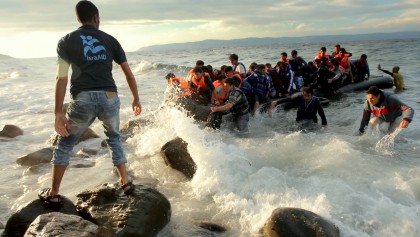Weaponizing People
Devra Torres | Feb 17, 2017

I ran across the phrase "weaponized empathy" the other day (in an article about immigration called "How to Defeat Weaponized Empathy": you can google it if you must, but I prefer not to link to it). Do you remember the picture of the little drowned refugee boy in the red shirt? The photo, which I don't have the heart to repost here, went viral, and for a brief moment, all of us here in cyberspace felt that a line had been crossed--this could not stand--something had to be done.
The author claims, though, that the little boy's body had been moved, repositioned for "maximum propaganda value." There's a before and an after picture. In the first, he's half hidden behind some rocks; in the second--the familiar one--he's lying on the shore, head to the waters, as if his little body had just washed up. You see? You're being manipulated. That image that awoke your empathy, and your desire to change immigration law? Contrived and artificial! Fake news! Don't fall for it!
It was strange, though. The author of the article didn't attempt to deny that the little boy drowned. He didn't deny that thousands upon thousands of just such toddlers are suffering and dying. He just showed the pictures of the body in one position, with someone, apparently some sort of aid worker, crouched beside it, then in another. It left a bad taste in my mouth--not because of the propaganda, but because of the leap from "They're trying to weaponize your empathy!" to "Don't fall for it! Don't empathize!"
Up to a point, he has a point--the same one personalists have been laboring to hammer into people's heads forever. You don't use people. You don't turn anybody into Exhibit A, just to prove your point. You don't feign interest in anyone's plight while secretly relishing what a neat and tidy illustration he is of your preferred ideology. And you don't determine public policy on the basis of sentiment instead of facts.
But that doesn't mean you ignore the actual person. That doesn't mean the person--this little boy, or anybody else--is less real, less important, than anybody's preferred policy.
I've seen this kind of weaponizing defended, by good guys and bad guys alike. There's an organization I used to support wholeheartedly--until I went to a conference and heard its president give a talk. As he was wrapping up, knowing what a friendly audience it was, he explained his fundraising strategy. "You need to get people angry," he confided. "Angry people write bigger checks."
He had learned how to weaponize their anger.
The thing is, it is sometimes good and necessary to awaken empathy, or anger, or even fear, where it's called for but doesn't spring up spontaneously, because of our sloth or hardness of heart. Affective response, as we at The Personalist Project have always insisted and Dietrich von Hildebrand spells out in The Heart, is not just some one-dimensional animal passion, serving only to stir up trouble and in need of domination by the more respectable faculties of will and intellect. The plight of a particular person, and the affective response objectively called for by that plight--these are no less real than all the facts and figures in the world.
So no--don't let the ideologues and politicians weaponize your empathy. Don't let the fundraisers weaponize your anger and fear. But don't throw the baby (your fitting affective response) out with the bathwater (somebody's cynical manipulation of that response). You'll end up losing a lot more than political victories.
